Update #2: Santiago de Chile, Thursday, 07:37
TAKEAWAY: Those are the phrases that best describe the sessions during the first day of the WAN IFRA Latin American conference in Santiago de Chile. We report the highights here. AND: While in Chile, revisiting the country’s leading daily, El Mercurio, 11 years after our redesign
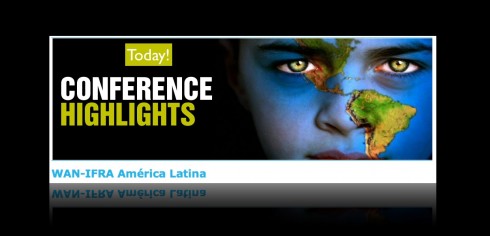
Finding solutions with a sunny attitude
It was a good day for exchanging ideas with a variety of experts in the media who gathered in Santiago de Chile for the second annual WAN IFRA Latin America conference.
The topics of discussion were all too familiar:
Will the printed newspaper as we know it survive?
How can a newsroom follow the right steps to guarantee flawless convergence?
What are some quick tips to stop declining circulations?
What to do about digital?
Should we have a tablet edition? Where do we start?
The mood in the room, however, optimistic and ready for the challenge. It may be that the large majority of these editors in attendance are Latin Americans. As several of the conference speakers made a point to mention: there is economic growth in this area of the world, and such growth lead to more people reaching the middle class and adopting the attitudes and habits of the middle class, including the reading of newspapers.
But, these editors are also concerned.
They have studied what has happened in the United States and Europe, and they are worried, and prepared not to make the same mistakes.
This is why I found the presence of Jack Griffin, a former TIME CEO, and now president of Empirical Strategic Advisors, as one that resonated with me—-and the audience.
Key points from Jack Griffin, who expressed optimism and showed that there are, indeed, opportunities:
No silver bullet for the American newspaper business, instead, there is a silver lining, with innovation
The use of smart mobile is having profound effect in the news business; the good news for news producers: news consumption higher
More readers using the lean back experience of a tablet, making it easier to consume news, but not easier for media to get paid
Mastering Mobile—important for news publishers; mor ethan 25% of US population gets news on mobile devices
The Huffington Post defines how news is presented today
American newspapers have experienced more business pain than any other industry, much self inflicted: monopolies, no competition
Today the large newspaper chains are beginning to disappear; with destruction of equity value, a return to local private ownership
Griffin told the audience to ask themselves the following questions on the way to innovation and survival:
Have I established a culture of innvoation?
Am I investing enough in the digital future of my company?
Do I have the right people int he right jobs? Is my cost structure sustainable? Who is my REAL competition?
In the end, Griffin smiled and said he feels positive about the way things are going for newspapers, adding:
No silver bullet for the American newspaper business, instead, there is a silver lining, with innovation
Which is his way of saying what I mentioned in my presentation, and I often repeat here: Editors and publishers, don’t lament, instead, celebrate that people are hungrier for news and information than ever before, and we have the best platforms to provide it.
Now if we only learn how to coordinate the effort, and get some good strategies to make money from it!
El Mercurio: a design evolves
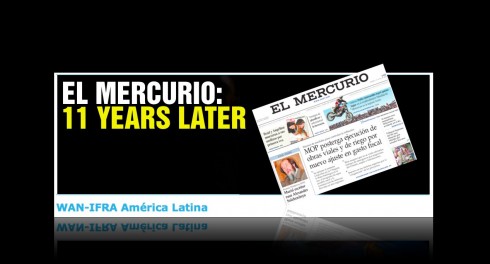
_OLD_thumb.jpg)
Here is one of the early editions of El Mercurio after our 2001 redesign
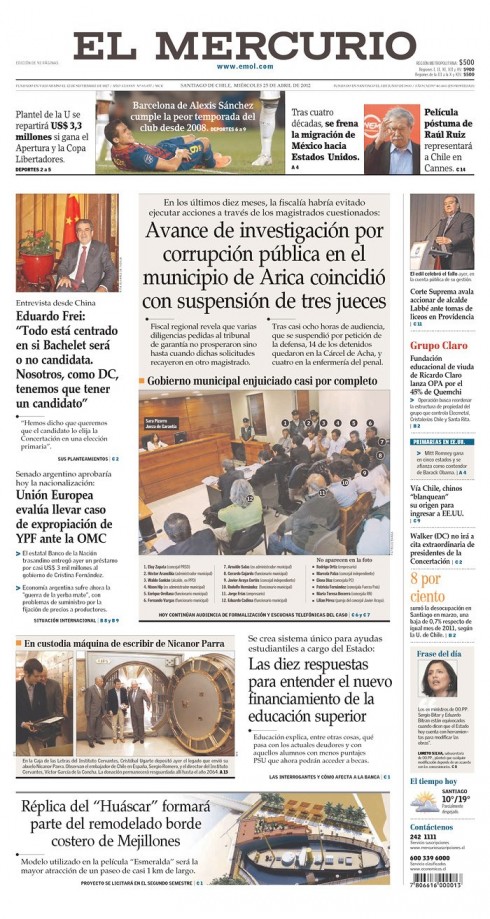
A recent front page from El Mercurio
Visiting Chile brings back the memories of our work with the country’s leading newspaper, El Mercurio, an iconic dean of Latin American journalism. This 185-year-old newspaper, reputed to be the oldest Spanish language newspaper in the world, continues to thrive, attracting a wide swath of Chileans to its readership, although perhaps lagging behind in becoming more multi platform in its offerings.
What El Mercurio does well is to interact with its readers through its Club de Lectores (Readers Club), which involves event planning, contests, travel, and was doing for the newspaper for years what social networks do today faster and more effectively.
In fact, at the WAN IFRA seminar, Patricio Moreno, marketing director of El Mercurio, showed the newspaper’s latest efforts to promote its offerings.
“The success of El Mercurio is based on a strong brand, which we promote and never forget that is there and it is powerful and credible to generations of Chileans,” Moreno said. “Our classified sections continue to go strong with segments about automobiles, property and jobs. But we also are committed to the stories, and we are focused to make sure that our story offerings never stop being the best.”
How about the design?
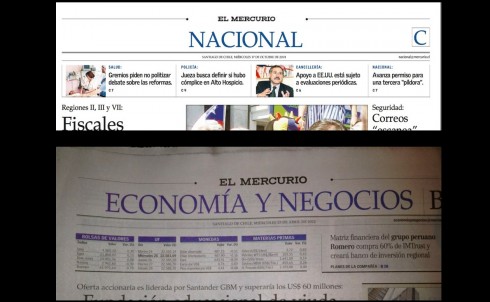
Here you see the original concept for top of the page headers, and how they still appear today (below)
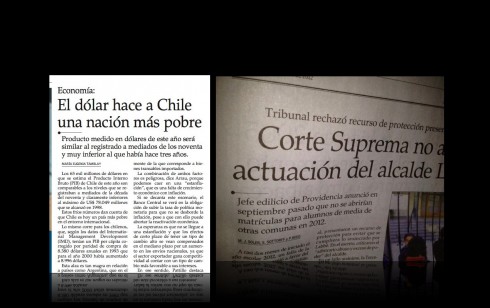
Story structures remain intact from the original concept, as you can see in the earlier version (left) and today
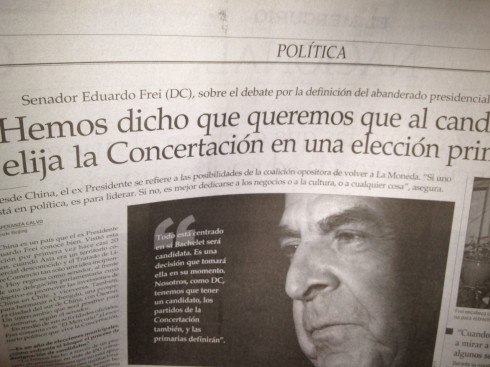
Photos tend to be played better and bigger today than when we originally created the design concept
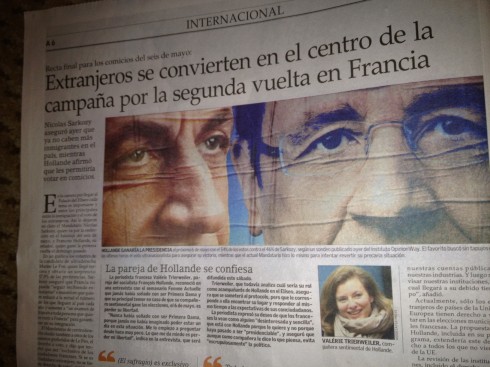
Large photos and more secondary elements appear on inside pages today, good evolution from what was a more text driven newspaper in 2001
As I took a look at current editions of El Mercurio, which we at Garcia Media redesigned in 1991, with a first edition of the new look launched on Sept. 12, 2001, the morning after that brutal 9/11 day, I realize that many of the basic foundations of the design are still there, while others have disappeared, a normal progression of any design.
I contacted El Mercurio’s Graphics Editor Marco Gatica about a discussion of the design:
The redesign of 2001 for El Mercurio marked a special era for Chilean journalism, not only for the great acceptance it enjoyed from our readers, but also because it left us a great school of how to present the news to make them more interesting, easier to comprehend and attractive.
It was a global change not just in the look ,but also our way of working with infographics, photos, page design, editing of the news. Now 11 years after this event, and, as one would expect, the original design has had adjustments made necessary by the passing of time and personnel changes in the newsroom. However, we conserve much of the basic structure and, above all, the teachings that Mario García shared with us especially this: what is important is to pay attention to what the readers want while maintaining the good traditions and the seal of a newspaper that is 185 years old and the oldest newspaper in the Spanish speaking world.”
Previous blog posts related to El Mercurio and Chile:
https://www.garciamedia.com/blog/articles/remembering_9-11_learning_the_real_meaning_of_change
https://garciamedia.com/blog/articles/chile_front_pages_not_big_enough_to_tell_this_story/
https://garciamedia.com/blog/articles/chil/
Putting the BOSS on page one
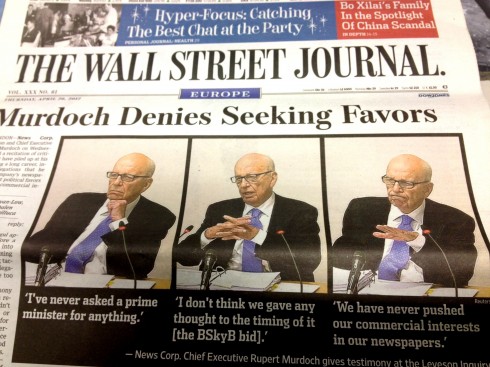
Today’s front page from The Wall Street Journal Europe carries a composite of photos of Rupert Murdoch, News Corp chief, during a hearing in London in which he was called to testify in connection with the hacking scandal involving News of the World, which was one of the newspapers in his media empire. I can only imagine what it would be for the editors of the WSJE to have to present their own boss on page one in circumstances that are less than positive. The headline and the quotes selected to be highlighted all emphasized Murdoch’s denial of any wrongdoing.
Of related interest:
– UK: Rupert Murdoch on closing News of the World: ‘I panicked’
http://www.poynter.org/latest-news/mediawire/171769/rupert-murdoch-on-closing-news-of-the-world-i-panicked/
TheMarioBlog post #1004